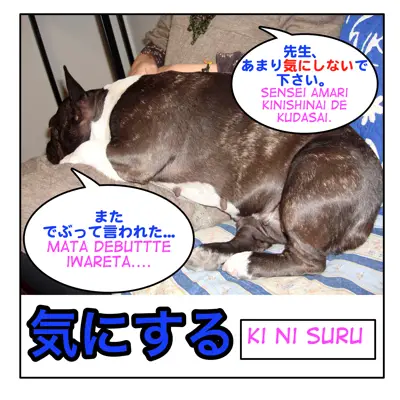「またでぶって言われた…」
= Mata debu tte iwareta…
= Somebody called me I am fat again…
「先生、あまり気にしないで下さい。」
= Sensei, amari kinishinaide kudasai.
= Don’t worry about it so much, Teach.
「最近、ニノのことが気になる…」
= Saikin Nino no koto ga kininaru…
= Recently I think about Nino often…/ I kind of like Nino now.
Hi everyone!
Today’s lesson is from a question from my Twitter follower, Yuki!
She asked me what is the difference between 気になる ( = kininaru ) and 気にする ( = kininsuru) and in what situation we use them.
It is too hard to answer this question on Twitter, so I made this lesson for her. Hope this lesson helps all of you!
気 ( = ki) means “feeling, sentiment, mind, air”, or something more profound or spiritual, like “active (life) energy” , “undefinable power”, or “prana”.
Japanese people have respected this invisible energy since ancient times.
Of course there are tons of idioms with 気 ( = ki) but I will just focus on 気になる ( = kininaru ) and 気にする ( = kininsuru) today.
First look at the pictures above,
🔸 The first picture :
「またでぶって言われた…」
= Mata debu tte iwareta…
= Somebody called me I am fat again…
Note : 言われた ( = iwareta ) is actually a passive form. “I was told/ I was called”
「先生、あまり気にしないで下さい。」
= Sensei, amari kinishinaide kudasai.
= Don’t worry about it so much, Teach.
So 気にする ( =kinisuru) means to mind, to care, to worry about something (usually something negative)
🔸 The second picture :
「最近、ニノのことが気になる...」
= Saikin Nino no koto ga kininaru…
= Recently I think about Nino often…/ I kind of like Nino now.
And 気になる ( = kininaru) means something/someone – interests you/ makes you think about it/them / catches your attention / makes you feel curious
Now let’s compare the following sentences.
a) あの噂が気になる
= Ano uwasa ga ki ni naru
b) あの噂を気にする
= Ano uwasa wo ki ni suru
Vocabulary : 噂( = uwasa) : rumors, gossip
There is a clear difference between a) and b)
While a) means you are just curious about the gossip b) means you have something to do with the rumor (possibly people are talking about you) and you are brooding over it.
But sometimes 気にする ( = kinisuru)and 気になる ( = kininaru) are interchangeable.
⬇️
c) マギーは太ったと言われたことをずっと気にしていました。
= Maggie wa futotta to iwareta koto wo zutto kini shite imashita.
d) マギーは太ったと言われたことがずっと気になっていました。
= Maggie wa futotta to iwareta koto ga zutto kini natte imashita.
The direct translation of d) is Being told she has put on weight has been bothering Maggie.
But we would translate the both sentences,
c) + d) Maggie has been brooding ever since someone told her she put some weight.
🗒️ Pay attention to the particles :
〜を気にする ( = ~ wo ki ni suru)
![]() を ( = wo) an object marker
を ( = wo) an object marker
→You worry about something
→〜が気になる ( = ~ ga ki ni naru)
→ が ( = ga) a subject marker
→Something/Someone – bothers you / makes you curious / interests you
Other difference:
⭐️You can make a negative imperative sentences with 気にする (= ki ni suru)
Don’t worry about it. / Don’t let it bother you. / Never mind
→ •気にしないで下さい。(= Ki ni shinai de kudasai.) formal
•気にしないで ( = Ki ni shinai de) casual
•気にするな ( = Ki ni suru na) blunt
• お気になさらないで下さい。( = oki ni nasaranai de kudasai.) very polite
But you can’t make a negative imperative sentences with 気になる ( = kininaru)
![]() We don’t say,
We don’t say,
X 気にならないで下さい。( = Kininaranai de kudasai) / 気にならないで ( = ki ni naranai de) / 気になるな ( = ki ni naruna)
Now I will show you the difference with more example sentences.
*******************
⭐️ 気にする ( = kinisuru)
★ to worry about something, to be concerned about something, to brood over something, to mind something
Ex. 試験の結果を気にする
= Shiken no kekka wo ki ni suru
= to worry about the result of the exam.
Note : This could be before or after you get the results.
Ex. 彼はいつも人の意見を気にしている。
= Kare wa itsumo hito no iken wo ki ni shite iru.
= He always worries about what other people think.
Ex. 上司に嫌なことを言われても気にしないでね。
= Joushi ni iyana koto wo iwarete mo ki ni shinai dene.
= Don’t worry even if your boss says something annoying.
★ to be sensitive about ~ , to pay attention
Ex. 細かいことは気にしないで下さい。
= Komakai koto wa ki ni shinai de kudasai.
= Don’t worry about the small things.
Ex. マギー先生はそんなささいなことは気にしない。
= Maggie sensei wa sonna sasai na koto wa ki ni shinai.
= Maggie sensei doesn’t worry about the small things.
Ex. 最近、外見を気にしてばかりいる男性が増えてきた。
= Saikin gaiken wo ki ni shite bakari iru dansei ga fuete kita.
=There are more and more men who are concerned about their own appearance
Ex. せっかくの初デートなのに彼 は時間ばかり気にしていた。
= Sekkaku no hatsu deito nano ni kare wa jikan bakari ki ni shite ita.
= It was our first date, but he just kept looking at his watch.
★To care about someone or something.
Ex. 母はいつも私がちゃんと食べているか気にしている。
= Haha wa itsumo watashi ga chanto tabete iru ka ki ni shite iru.
= My mother always worries if I am eating properly or not.
Ex. いつも私のこと、気にしてくれてありがとう!
= Itsumo watashi no koto ki ni shite kurete arigatou!
= Thank you for always caring about me.
![]() There is a similar idiom , 気にかける ( = ki ni kakeru) but it shows deeper concerns.
There is a similar idiom , 気にかける ( = ki ni kakeru) but it shows deeper concerns.
*************************
⭐️ 気になる
★ to be disturbing / to get one’s nerve (negative)
Ex. 隣に座った人のヘッドホンからの音もれが気になる
= Tonari ni suwatta hito no heddohon kara no otomore ga ki ni naru.
= The sound leakage from the headphone of the person who sits next to me bothers me.
Ex. あいつのあの笑い方が気になる
= Aitsu no ano warai kata ga ki ni naru.
=The way he laughs gets on my nerve.
Ex. 長年一緒に住んでいると相手のやること一つ一つが気になってくる。
= Naganen issho ni sunde iru to aite no yaru koto hitotsu hitotsu ga ki ni natte kuru.
= Since we’ve lived together so long, every single thing he does gets on my nerves.
★to worry about / to be concerned about
Ex. 1) 今月の電気代が気になる
= Kongetsu no denkidai ga ki ni naru.
= I’m worried about the electric bill this month.
Ex. 2) 父の容態が気になる
= Chichi no youtai ga ki ni naru.
= I am concerned about my father’s condition.
Note : Ex.1) and Ex.2) can be replaced with を気にする ( = wo ki ni suru)
If you say
父の様態が心配だ。
= Chichi no youtai ga shinpai da.
We can tell the (medical) condition of his father is very critical and the speaker really worries about his condition.
Ex. 二の腕の脂肪が気になってきた。
= Ninoude no shibou ga ki ni natte kita.
= The fat of my upper arms has started to bother me.
Ex. この中から気になる症状がありますか?
= Kono naka kara ki ni naru shoujou ga arimasu ka?
= Are there any symptoms which bother you?
Ex. 田舎に住んでから早起きが気にならなくなった。
= Inaka ni sunde kara hayaoki ga ki ni naranaku natta.
= Since I moved to the country, I don’t mind getting up early.
★to be curious about, to catch one’s attention
Ex. あのドラマの結末が気になる
= Ano dorama no ketsumatsu ga ki ni naru.
= I am curious about how the drama ends.
Ex. 最近、気になる女の子がいる。
= Saikin ki ni naru onna no ko ga iru.
= There is a girl that I like / am interested in lately.
Ex. 誰か気になる人がいるの?
= Dare ka ki ni naru hito ga iru no?
= Is there anybody you like?
* It is often used for romantic interests.
Note : Japanese culture is very vague (曖昧 = aimai lesson) and often avoids straight expressions.
:qq: Now when you use a verb with 気になる( = kininaru) it’s different from the above examples,
→ verb + 気になる ( = kininaru) means to feel like doing something / to be motivated to do something
→ ~する気になる = ~ suru ki ni naru
Ex. やっと勉強する気になってきた。
= Yatto benkyou suru ki ni natte kita.
= I finally feel like studying.
Ex. 本人がやる気になるまで待ちましょう。
= Honnin ga yaru ki ni naru made machimashou.
= Let’s wait until she/he feels like doing/ get more motivated.
There is a common set phrase that uses both 気にする ( = kini suru) and 気になる ( = ki ni naru)
Ex. 気にするなと言われても気になる。
= Ki ni suruna to iwarete mo ki ni naru.
= Even though people tell me not to worry, it bothers me. (I can’t help thinking about it.)
🔸 Bonus!!
When we hear 気になる ( = kininaru), many of us automatically link the word with this long run TV commercial song called 日立の樹 ( = Hitachi no ki)
The lyrics goes,
→ この木なんの木、気になる木、
= Kono ki nan no ki, ki ni naru ki
=What kind of tree is this? This tree makes me wonder
名前も知らない木ですから
= Namae mo shiranai ki desu kara
=Since we don’t know the name of the tree,
名前も知らない木になるでしょう。
= Namae mo shiranai ki ni naru deshou.
= It will be a tree without a name.
It is a pun with 木(=ki), tree and 気(=ki)
Actually the tree has a name, Monkeypod, and it is found in Hawaii.
Many Japanese tourists keep visiting this tree in the Moanalua Gardens in Oahu where the commercial was shot.
I wonder what Hawaiian people think about this phenomenon.
I have been there as a Japanese tourist,too. And yes, it was a beautiful tree.
 マギー先生より = Maggie Sensei yori = From Maggie Sensei
マギー先生より = Maggie Sensei yori = From Maggie Sensei
最近、誰か気になる人はいますか?
= Saikin dare ka ki ni naru hito wa imasu ka?
= Is there anybody you are interested in recently?
****
I appreciate your support! サポートありがとう! !
My supporters can access tons of audio files, PDF files, and special lessons on my Patreon page.
❤️ありがとう x 2: Mini lessons, PDF files with audio for all the lessons here from 2018
❤️ありがとう x 5 In addition to the previous benefit + Daily Japanese
Check the index of Daily Japanese Series →Index
❤️ありがとう x 10 In addition to the previous benefit + PDF file of all my Twitter lessons for a month (average 10 ~ 18 pages) with an audio file. Please check the details here
One-time support ↓ ありがとう!






55 Comments
Hi maggie sensei. from what i understand Verb plus ki ga suru means” to feel like doing something” as well. is there any difference with that and verb + ki ni naru?
Hi Matthew,
There are many ki-idiomas.
ki ni suru = to be concerned about ~ . to worry about ~
ki ga suru = to have a hunch ~ / feel like ~
Ex. 誰かが外にいるような気がする
= I feel like someone is outside.
Ex. それはおかしい気がする
= I think that is strange.
Hi Maggie, I have a question. Recently my leg hurts and it’s a big problem because I have to walk all the time in the workplace. My boss asked me if I’m okay, so I replied that everything’s fine and I said “気にしなでください”. He responded using “気になる”. I’m not so sure about his behavior towards me. If I’m just and employee for him or he likes me. Is this a clue or maybe it means nothing?
Hi Elliot
Ah in that case he is worried about your leg.
No romantic meaning.
どうして、Elliot San の社長は返事には«気になる»を使いますか
気になる—–» to be interested in smth. ですね
Hello Nipun kumar
It depends on the context.
It could be
I am concerned about (something)
It is curious that ~
I am interested in ~
インドには、がんを持つかたの数が増えていくのをきにしています。 がんのせいで、 生活は苦しく なってくるのが気になっています。
先生、
正しいですか。
宜しくお願いします。
こんにちは、 Pavithra D
がんを持つかたの数が増えていくのをきにしています。→がんにかかる人の数が増えているのを心配しています。
“生活は苦しく なってくる”というとまず浮かぶのが”経済的に大変な生活になる”というイメージです。
to live, lifeには人生、生活、命、生きることなどいろいろな言い方がありますが意味が違います。
どういう意味で言いたかったですか?
ありがとうございます先生。 がんにかかったため、 病人のくらしは 精神的や 身体的や経済的にたいへんになるかもしれない といういみです。
どの たんごが適当ですか。
わかりました。生活はevery day lifeですがそれでよければ生活でもいいです。
がんのせいで、 生活は苦しく なってくるのが気になっています。
→がんのせいで、生活が苦しくなるのが心配です。(Note:自分が当人でなければ、 「なってくる」よりも「なる」でいいと思います。「気になる」だと気持ちが弱い(curious) ので「心配」にしたらどうでしょう。
Hi Maggie 先生, I don’t know if you answer questions here anymore, but here I go anyways.
So I saw this comment on a youtube video:
上手くなった気になれる
I think it might mean “I am interested in how you got so good”, but the なれるmakes me think that it might mean another thing. Could you help me out? Thanks!!
Hi Pablo,
上手くなった気になれる
It makes me feel like I do better.
V past tense +気になる = you feel like you did something (even if you actually didn’t)
気になれる (potential form) to be able to feel
Hi Maggie Sensei!
Thank you for the wonderful lesson once again. I’m just wondering why after some verbs, there’s きた?
e.g やっと勉強する気になってきた
Why can’t I say やっと勉強する気になりました。
Can I also use any verbs in front of that grammar pattern or only suru verbs?
Thank you very much!
Hello Forest,
the pattern ~てきた implies here that a change has happened. In English you can translate ~てきた as: “started to”.
Both sentences are correct from the grammatical point of view, however 「やっと勉強する気になってきた」 is more specific, it gives us more information. 詳しくはこちらへ => http://142.93.68.150/2010/03/13/requested-lesson-「〜ていく+〜てくる」teiku-tekuru/
Q: Can I also use any verbs in front of that grammar pattern or only suru verbs?
A: There’s no limitation. However, the sentence must be logical of course.
ヨロシク。
@天人
Thank you for helping @Forest!
Hi 天人、
Sorry for my late reply. Thank you for your help!
Oh and also this one character said 「ササと早く」 in the context of hurry and go to sleep, but i didnt get what she meant by ささと
@ ジェリエル
ササと / サッサと・さっさと is a mimetic word to describe some quick movement.
To do something quickly = ささと・ササと / サッサと・さっさと〜する
So in this case, you emphasize the word 早く (fast).
Maggie sensei!
Can you explain 立ちいる気がない
Its from this anime, i think it’s translated as “i didn’t mean to pry”
The full sentence was 「別に立ち入る気がないんでせけど」
Can i use (verb plain form)気がある to modify 気?
@ ジェリエル
Hello, ジェリエル
OK,
立ち入る= intrude
〜気がない = no intention to do something/not to feel like doing something
So 立ち入る気がない means “I don’t meant to intrude.
Maggie-sensei, konnichiwa!
I have this favorite song with した right after 色 on its lyrics. Here it goes:
優しい色した空を映して 高層ビルがやけにキレイだ
…..
悲しい色した誰かの為に 今の自分に何ができるのか?
…..
I just wanted to ask what is the meaning and role of this word on each line ’cause I can’t seem to make out the meaning of it using its usual use as ‘to do’ with する. And what would be its english translation for you.
Thanks for the help in advance!
@aiji
Hi aiji, ohayou!!
OK, When we describe some typical color, you say 青い空 or 青い色の車
you see “color + した” in poetic expressions or when things have unusual color. 青い色をしたお酒
優しい色をした空= The sky with sweet colors
悲しい色をした誰か= someone with sad color
説明してありがとうございます。わたしの日本語はまだまだです。「気にする」と「気になる」では違うのを分ると思っています。
But it sounds like since 気になる has a few different meanings does it make it hard to infer based on the context of the sentence what the usage is for those scenarios?
@hoshi
こんにちは、hoshi!
ごめんなさい。質問の意味がよくわからないのですが…
Hello. What I’m trying to say since 気になる has quite a lot of meanings how does someone figure out if they are curious/interested/annoyed based on what they are trying to say in a sentence?
@hoshi
Ah, I see.
Usually we know the meaning by the context.
ちょっと質問があるんですが、誰かが好きの場合は「気がある」という表現は漫画で出てきました。
「。。。さんに気がある」と「。。。さんに気になる」の両方は「好き」っ意味になりますか?
@Lava
はい、誰かに好意を持つことを「〜に気がある」と言います。
「〜さんに気がある」は言いますが、「〜さんに気になる」は言いません。
「気になる」は to worry, to have something on one’s chestという時に使いますよ。
Maggie先生、この授業をかいてくれてありがとうございました。とても分かりやすいし、例文も多いので私は Maggie先生のおしえかたが気になってきましたよ。
@Caedmon
ありがとう!Caedmon! また来てね! :)
Thank you so much! Because there are different meanings behind ki ni naru, I was never completely sure what it meant. This is so helpful! Thank you!
@Jenna
Hi,Jenna! よかった! Now you know the difference!
This was a great lesson! I am a member of the Moron Army but I’ve not spent much time on this site. I really should though…this info is so infortmative! Thanks, I WILL be visiting more often =) BTW I think you forgot “ni” in the romanji sentence “Haha wa itsumo watashi ga chanto tabete iru ka ki ni shite iru.”
@csleverette
Thank you for spotting the typo. I fixed it. Yes, please visit this site more often.
Great lesson!
@giugnhgbvinierngvb89
Thank you!!
先生、ご無沙汰しております
相変わらずわかりやすいレッソンを作りましたね
最高です!
実は、私、試験に通って、今日本の大学別科に勉強してます:D それで、先生と少しでも近づいてましたねLOL
もしコトバが間違っていったら、直してくれますか?
ありがとう:D
@薫
お久しぶりです!試験合格、おめでとうございます!!日本の大学生活はどうですか?
はい、それでは添削しますね。
*レッソン→レッスン
*大学別科に→で
*それで、先生と少しでも近づいてましたね→これで先生と少し(でも)近づきましたね。
楽しい学生生活を過ごして下さいね!!
直してくれてありがとう、先生!
「に」と「で」はしょっちゅう間違っているので、困っていますわ。
「大学で」の「で」は、範囲ですか?
「に」も、範囲の意味がありそうですね、どうしてかな~
@薫
「に」と「で」の使い分けはみなさん、苦労しているみたいですね。Twitterでも一度練習したことがありますが、また機会があったらレッスンを作ってまとめてみますね。
「勉強する」というactivityをする時は「〜で(勉強をする)」を使います。
そうですか。twitterでも練習しましたね。
捜してみます。
じゃあ、
大学で勉強している。
会社で働いている。
ただしいですか?
@薫
*大学で勉強している。
*会社で働いている。
そうそう、二つとも合ってます!! :h:
As for the quiz, check May 1st quiz in Maggie’s room on this site.
先生のブローグはとてもべんりです!
みつかってよかったです。
from now i will visit your blog at least once every week.(先生、この文を日本語に訳していただけませんでしょうか?)
先生、もし、間違ったところがあれば直してください。どうぞよろしくおねがいします!=)
@Edwin
はじめまして、Edwin! は〜い、じゃあちょっと直しますね。
•ブローグ→ブログ
•みつかってよかったです。→ It is grammatically correct but not natural. We use this phrase when you find something you have been looking for.
So (このブログを)みつけることができて(or このブログにであえて)よかったです。or うれしいです。 will be more natural.
あとはよく書けてましたよ!
★from now i will visit your blog at least once every week
→ これから少(すく)なくとも毎週(まいしゅう)1回(かい)はこのブログに来(き)ます。
ありがとう!またいつでもこのブログに来て下さいね!
from now i will visit your blog at least once every week
Great post, I always wondered about the difference between those two — sounds like its pretty subtle in meaning, but the difference is more in usage.
来週に東京に行くので、僕の日本語を気なって来ます。
tried to say: since I am going to Japan next week, I am getting concerned about my Japanese ability.
気is a very interesting word, and one we talk about quite a bit in 合気道 Aikido. In fact, here is a blog post about Ki on aikiweb readers might find useful. http://www.aikiweb.com/language/ki_phrases.html
Thanks again for your lesson. I don’t know how you do it, but keep it up!
@applezoid
Good! Youu picked the right one. Just a little correction though…
気なって→ 気になって
So it will be 来週東京に行くので、僕の(or 自分の)日本語(能力=nouryoku)が気になってきました。
Thank you for the link.
I tried 合気道 for 6 months in past. It was wonderful!
Doh! I forgot the に!lol Yes Aikido is great. I’ve been doing it for nearly four years now and I love it!
@applezoid
Oh then you are an expert of “気” !! :)
Lol Nope, I’m only scratching the surface — just like Japanese, it’s a lifelong pursuit!
ずっと気になってたところを教えてくれてありがとうございます。すごく役に立てましたよ。
@Yuki
どういたしまして!さっそくチェックしてくれてうれしいです!
Note : ずっと気になってた→もうちゃんと使えますね〜♪
(A little correction : 役に立てました→almost! 役に立ちました)
これからもわからなくなったらいつでも聞いてくださいね。
授業は相変わらず役に立ちました。
ありがとうございます
「外見を気にしてばかりいる男性が増えてきた。」
私にはこの文法が少し難しいです。
Can you please explain: te + bakari iru?!
@Bruce
Sure! 「~てばかりいる 」は、一つのことだけをずっとやっているときにつかいます。
★verbて + ばかりいる = just doing something、keep doing something, always doing something
Ex. 彼は食(た)べてばかりいる =He is always eating. / He just keeps eating.
Ex. Bruceは勉強(べんきょう)ばかりしている = Bruce is always studying.
Ex. マギーは仕事(しごと)をしないで遊(あそ)んでばかりいる。= Maggie just plays around and she doesn’t work.
Feel free to make a sentence. I can correct you.
ありがとう。
例文を作ってみます。
彼は急いでばかりいる
He is always hurrying?!
@Bruce
完璧= かんぺき=Perfect!!! Good job!